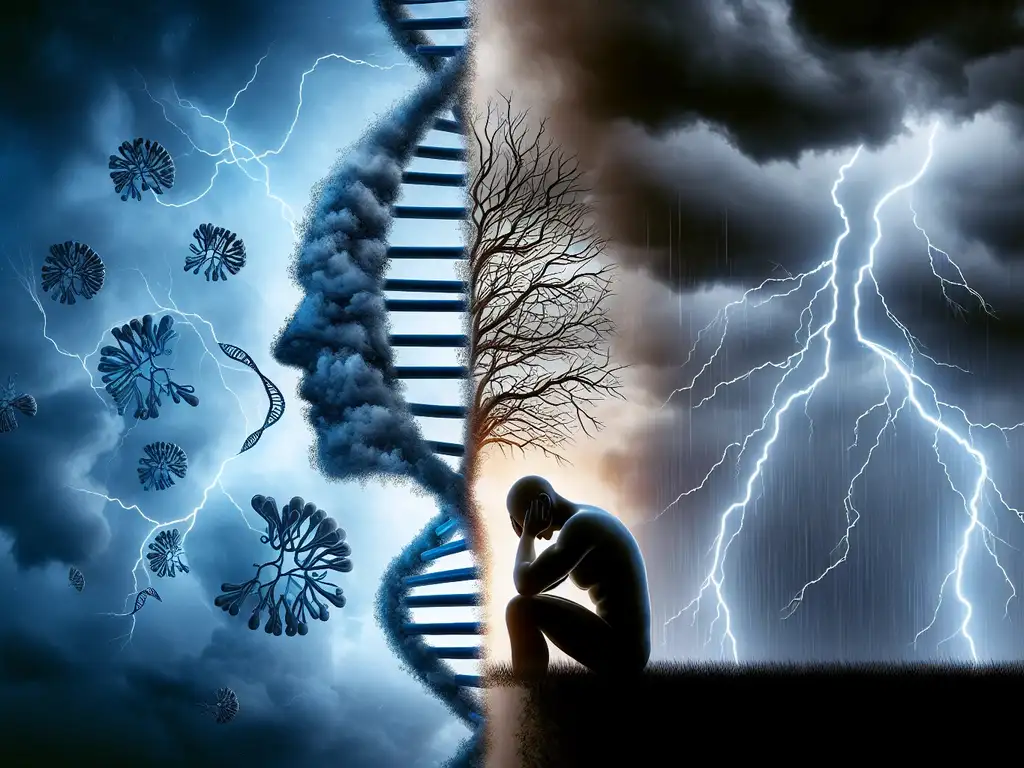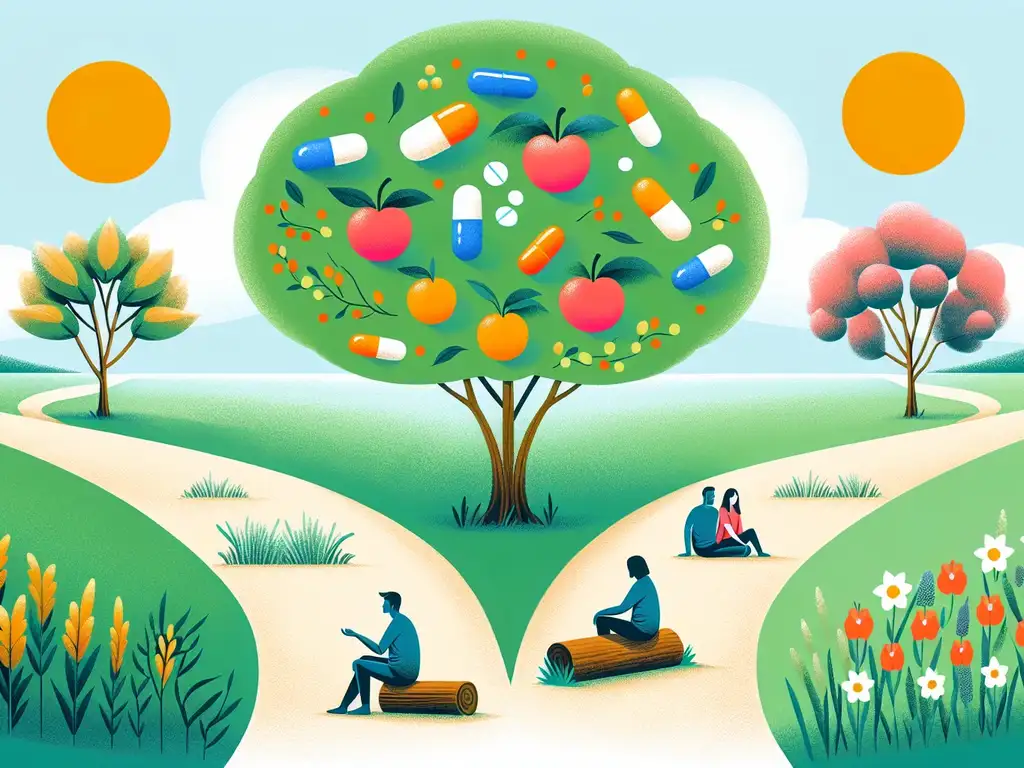Clinical depression, a Behavioral Health condition that affects millions worldwide, is often misunderstood and underestimated. Organizations like Care Plus NJ offer comprehensive services to support those struggling with this concern, providing effective treatments and hope to many addressing Behavioral Health conditions.
This article aims to provide a comprehensive understanding of clinical depression, covering types, symptoms, depression risks, causes, and treatment options. By shedding light on this topic and the emotional and physical problems, we hope to empower those affected by major depression and their loved ones with the knowledge and support they need to navigate the path to recovery.
Article Overview
- Clinical depression, also known as major depression, is a mental illness and condition with varying types and symptoms, requiring proper identification for suitable treatment.
- Treatment of clinical depression can involve therapy, medication, and alternative treatments tailored to the individual’s needs and depressive episode(s).
- Seeking help from healthcare providers like Care Plus NJ and building support systems are essential for individuals with clinical depression to improve their outcomes & well-being.

Clinical Depression: Definition and Types
Clinical depression is a Behavioral Health condition characterized by a persistently low or depressed mood and a lack of interest in activities that were once pleasurable. It is estimated that between 5% and 17% of individuals will experience clinical depression, also known as major depression, at some point in their lives. Clinical depression is not synonymous with simply being in a state of sadness, and individuals who suffer from depression cannot simply choose to be rid of it. Rather, depression is a pervasive, serious, and treatable affliction that continues almost daily for a minimum of two weeks and involves additional symptoms beyond merely sadness.
Clinical depression encompasses various types of depressive disorders, including:
- Major depressive disorder
- Persistent depressive disorder
- Seasonal affective disorder
- Postpartum depression
Understanding the different types of depressive disorders can help in identifying and addressing the unique challenges faced by individuals experiencing depression.
Major Depressive Disorder
Major depressive disorder is a Behavioral Health disorder characterized by a persistent low mood and loss of interest in activities, lasting for at least two weeks. It is different from bipolar disorder, which involves episodes of both depression and mania. Around 280 million people globally are affected by major depressive disorder, a type of mood disorder. This disorder can have a profound impact on daily life and functioning, manifesting as a low/blue/down mood, a lack of interest or pleasure in activities, and a decrease in energy levels. Behavioral Health concerns, such as major depressive disorder and bipolar disorder, require proper attention and treatment to ensure better outcomes and wellness for those affected.
People with major depressive disorder may also experience difficulty concentrating, making decisions, and remembering things.
The diagnosis of major depressive disorder, as outlined in the Diagnostic and Statistical Manual, is based on a combination of the individual’s reported experiences, observations reported by family or acquaintances, and a mental standing evaluation. Testing may be done to rule out other physical conditions that can produce similar symptoms. However, there is no laboratory test to diagnose this disorder.
Acquiring knowledge about the features and widespread occurrence of major depressive disorder aids in offering suitable support and treatment for those affected.
Other Depressive Disorders
In addition to major depressive disorder, other depressive Behavioral Health conditions include persistent depressive disorder (also known as dysthymia), recurrent depressive disorder, seasonal affective disorder, and postpartum depression. Persistent depressive disorder is a form of chronic depression characterized by a sad or dark mood most of the day, on most days, for at least two years. It is a mild to moderate form of depression that lasts longer than major depressive episodes, but is not as intense as severe depressive episodes. Diagnosis of persistent depressive disorder is typically conducted by a psychiatrist, psychologist or licensed clinician, who evaluates the individual’s symptoms, duration of symptoms, and the effect on daily functioning.
Seasonal affective disorder (SAD) is characterized by:
- Feelings of persistent depression
- Reduced interest in activities
- Low energy levels
- Other symptoms that occur during specific seasons, typically fall into winter.
Postpartum depression, on the other hand, affects new mothers and may be triggered by hormonal fluctuations following childbirth and the physical and emotional strain of caring for a newborn. Identifying these varied forms of depressive disorders is significant in offering suitable support and treatment for individuals impacted by them.
Identifying Symptoms of Clinical Depression
Symptoms of clinical depression can be emotional, physical, and cognitive in nature. Emotional symptoms may include persistent feelings of sadness, loss of interest in activities, feelings of worthlessness or guilt, and difficulty concentrating. Symptoms that manifest physically may include sleep disturbances, chest discomfort, fatigue, musculoskeletal pains, digestive issues, dizziness or lightheadedness, back pain, and restlessness. Cognitive symptoms, on the other hand, include reduced attention and concentration, impaired learning and memory, and executive dysfunction.
These symptoms can significantly impact a person’s ability to:
- Think
- Concentrate
- Make decisions
- Complete mental tasks
Comprehending and spotting the varied symptoms of clinical depression is significant for timely intervention and successful treatment. Recognition of these signs in oneself or a loved one simplifies the process of seeking professional help and commencing the path to recovery.
Depressed Mood and Emotional Symptoms
Depressed mood and emotional symptoms of clinical depression include persistent sadness or low mood, feelings of hopelessness or worthlessness, loss of interest or pleasure in activities, irritability or agitation, and difficulty concentrating or making decisions. The psychological impact of these feelings can result in fatigue, lack of energy, insomnia, and a decrease in interest in activities they once enjoyed. Some individuals may direct these feelings of anger and irritability towards themselves and others. Anger is a very common, and easier to access emotion, that often shows up or is perceived outwardly when someone is suffering internally with depression.
Emotional symptoms of clinical depression should not be overlooked. Acceptance and addressing these feelings is a vital step in seeking assistance and discovering successful treatment.
Physical Illness Symptoms from a Major Depressive Episode
Physical symptoms associated with clinical depression can include changes in appetite, sleep disturbances, and fatigue. Clinical depression can cause difficulties with initiating and maintaining sleep, as well as impacting the quality of sleep. Insomnia is a common symptom of depression, while some individuals may experience excessive sleeping. A negative cycle often exists between depression and sleep, where poor sleep can exacerbate depression symptoms, and depression can further disturb sleep. Moreover, the causes of fatigue in people with clinical depression include disrupted eating habits, sleep disturbances, altered neuroindividualmitter levels, and other somatic concerns.
Less common physical manifestations of clinical depression may include:
- Chest pain
- Aching muscles and joints
- Digestive issues
- Headaches
- Alterations in appetite
- Weight loss or weight gain
- It is important to keep in mind that different cultures and ethnicities will talk of somatic or bodily concerns as a manifestation of depression and may be less likely to notate the emotional and cognitive parts of depression.
- Children often complain of somatic concerns as they may lack the vocabulary and understanding to articulate emotional distress
Recognition and addressing these symptoms is significant as they can considerably impact overall wellness and daily operation.
A major depressive episode can be diagnosed as a single episode depressive disorder, mild depression, moderate depression, or severe major depression. According to the Diagnostic and Statistical Manual of Mental Disorders DSM-5 each diagnosis has criteria based on the acuity presented. There is also a diagnosis for treatment resistant depression. Psychiatrists and other Behavioral Health professionals are familiar with treatment resistant depression and will help look at alternatives
Cognitive Symptoms
Cognitive symptoms of clinical depression include difficulty with thinking, impaired concentration, difficulty in making decisions, and a reduced capacity to complete mental tasks. Major depressive disorder has been associated with significant cognitive impairment, including difficulties with attention, memory, information processing, decision-making, and executive function. These cognitive symptoms are often persistent and can significantly impact daily functioning.
Identifying and addressing these cognitive symptoms is vital as they can substantially impact an individual’s functional capacity in varied life aspects. Pursuing suitable treatment can aid in enhancing cognitive functioning and overall lifestyle quality.

Risk Factors and Causes
Risk factors and causes of clinical depression can be:
- Genetic: history from family and the presence of certain genes associated with depression
- Environmental: mental stress, social nonconformity, bullying, bereavement, and exposure to environmental contamination
- Psychological: low self-esteem, negative thinking patterns, and a history of severe psychological distress or abuse
- Medical conditions and medications
Psychological factors can include:
- Exposure to physical, biological classificationual, or emotional abuse
- Having excess weight or obesity
- Experiencing pain or physical illness
- Misusing alcohol or drugs
Comprehending these factors and causes is pivotal for timely intervention and effective treatment. Acknowledging the interplay between genetic, environmental, psychological, and medical factors aids individuals and healthcare providers in customizing treatment plans fittingly.
Genetic and Family History
The history and genetics of a family can be a contributing factor to the development of clinical depression. Research has indicated that certain genes, such as PER2, CKie, PER3, CLOCK, BDNF, FKBP5, and NR3C1, have been associated with clinical depression. Additionally, individuals with history of family members having depression are more likely to develop the disorder themselves, with the risk of depression correlated with the number of affected family members, as well as earlier age of onset and more chronic or recurrent depression.
Comprehending the influence of history and genetics of a family in the development of clinical depression is significant in identifying individuals higher likelihood of harm and offering suitable support and treatment. Timely intervention can aid in preventing the onset of depression or reducing its intensity.
Environmental and Psychological Factors
Environmental and psychological factors, such as stress and severe psychological distress, can contribute to the onset of depression. Some examples include:
- Stressful conditions such as those in the home or workplace
- Managing family life and a career
- Caring for an elderly parent
- Raising a child solo
These factors can raise the likelihood of clinical depression in individuals who are predisposed to it. Additionally, post-severe psychological distresstic stress disorder (PTSD) and childhood severe psychological distress are types of severe psychological distress that can lead to clinical depression.
Identifying the influence of environmental and psychological factors on the development of depression is significant for early intervention and successful treatment. Tackling these factors can assist individuals in developing coping strategies and resilience, reducing the risk of depression development or lessening its intensity.
Medical Conditions and Medications
Medical conditions and certain medications can also increase the risk of developing depression. Personality traits such as:
- Low self-esteem
- Trauma experienced during early life
- Genetic predisposition
- History of depression in the family
These traits have all been linked to an increased risk of developing clinical depression. Additionally, medical conditions such as diabetes and lupus have been associated with an increased risk of depression.
Certain medications that may be linked to an increased risk of developing clinical depression include:
- Corticosteroids
- Isotretinoin
- Hormonal medications (e.g., birth control pills)
- Some anti-seizure medications
Awareness of these Behavioral Health conditions and medications aids individuals and healthcare providers in monitoring and addressing potential risks, leading to improved Behavioral Health outcomes.

Treatment and Options for Clinical Depression
Treatment options for clinical depression include:
- Medication for depression: Antidepressants can help regulate mood and alleviate symptoms of depression.
- Talk therapy: This includes cognitive-behavioral therapy, which can help individuals develop coping strategies and address negative thought patterns.
- Alternative treatments: These can include exercise and mindfulness practices, which can be beneficial in treating depression.
Comprehending the varied treatment options available for clinical depression is vital in finding the most suitable and successful approach for each individual. A combination of treatments may be necessary to cater to the unique needs and challenges of those battling depression.
Antidepressant Medications
Antidepressants are a type of medication that can help regulate mood and alleviate symptoms of depression by altering the utilization of certain neuroindividualmitters in the brain. The most commonly prescribed antidepressants for clinical depression include SSRIs (Selective Serotonin Reuptake Inhibitors) such as fluoxetine (Prozac), sertraline (Zoloft), and escitalopram (Cipralex). Antidepressants generally require 4 to 8 weeks to manifest their full effects.
Working closely with a healthcare provider to determine the most suitable medication and dosage for each individual is significant. Consistent monitoring and modifying treatment as required can aid in ensuring the most successful relief of depression symptoms.
Therapy
Talk therapy, also referred to as psychotherapy, can be advantageous in treating clinical depression in a variety of ways. It assists individuals in developing a new outlook on their issues, teaching them coping strategies, recognizing and altering unhealthy patterns, as well as providing support and encouragement. Various forms of therapy utilized in treating clinical depression include cognitive therapy, behavioral therapy, interpersonal therapy, and supportive therapy.
Cognitive-behavioral therapy (CBT) is a popular and effective form of talk therapy that assists individuals in managing their symptoms and making positive modifications in their behavior. Working with a clinician who specializes in CBT can provide significant benefits in addressing the emotional and cognitive symptoms of depression.
Alternative Treatments
Various alternative treatments for clinical depression include:
- Herbal therapies such as St. John’s wort and ginkgo biloba
- Acupuncture
- Exercise
- Mindfulness
- Eye movement desensitization reprocessing (EMDR)
- Complementary approaches like massage and yoga
Exercise has been shown to have a positive effect on clinical depression, promoting nerve cell growth, preventing the development of depression, reducing symptoms, and decreasing the risk of depressive symptoms.
Mindfulness-based practices, such as meditation and mindfulness exercises, have been demonstrated to assist in managing symptoms of depression and preventing relapse. Exploring varied alternative treatments and collaborating with a healthcare provider to find the most fitting approach for each individual’s needs and preferences is significant.
Seeking Help and Support
Seeking assistance and support is vital for individuals battling clinical depression. Timely intervention and treatment can substantially enhance outcomes and overall well-being. The steps for seeking assistance for clinical depression include:
- Acknowledging that you are experiencing depression
- Obtaining help from healthcare providers such as Psychiatrists and Clinicians
- Connecting with helplines or hotlines for immediate aid
- Examining the various medications and treatment plans available for depression
- Utilizing support networks and participating in therapy or counseling
Constructing a support network, including friends, family, and support groups, can assist individuals in navigating their recovery journey. A robust support network can provide emotional, practical, and social support, aiding individuals in feeling understood, validated, and less isolated in their struggles.
Finding a Professional for Help
Finding a professional, such as a therapist or psychiatrist, can provide guidance and treatment for individuals struggling with clinical depression. To find a reputable psychiatrist or therapist for depression treatment, you can:
- Request recommendations from your primary care physician or other healthcare professionals.
- Look into referrals from friends, family, or support groups who have had positive experiences with their psychiatrist or therapist.
- Confirm with your insurance provider for a list of in-network psychiatrists or therapists.
- Utilize online directories such as Psychology Today or the American Psychiatric Association’s Find a Psychiatrist tool to search for professionals in your area.
Once you have identified a Behavioral Health professional, it is advisable to schedule an appointment to discuss your symptoms and treatment options. Working with a qualified professional who specializes in depression treatment can significantly improve outcomes and overall well-being.
Building a Support System
Establishing a support network, welcoming of participation of friends, family, and support groups, can assist individuals in navigating their recovery path. Friends and family can provide empathy, understanding, and non-judgmental listening to establish a supportive environment for an individual with depression. They can offer practical support, encourage professional assistance, create a safe environment for open communication, participate in activities together, educate themselves about depression, and exercise patience and understanding.
Individuals with depression can access support groups by:
- Contacting SAMHSA’s National Helpline: 1-800-662 HELP (4357)
- Researching online resources such as WebMD and Verywell Mind
- Investigating online depression support groups
- Inquiring with local Behavioral Health organizations or community centers
Participating in support groups and therapy can provide valuable emotional and social support, assisting individuals in managing stress, reducing feelings of isolation, and enhancing overall Behavioral Health and well-being.
Care Plus NJ Services
Care Plus NJ offers a range of Behavioral Health services, including counseling and therapy for individuals with clinical depression. They provide comprehensive, recovery-focused Behavioral Health services for adults, adolescents, children, couples, and families facing clinical depression for an individual or within a family system, ensuring that all patients receive the best possible care.
Care Plus NJ’s counseling and therapy services address the needs of patients with Major Depressive Disorder through a comprehensive approach. They provide a range of services to support individuals in their journey with an emphasis on both the mind and body.
Accessing Care
To access care at Care Plus NJ, you can submit an online intake request form via their website or call their Admissions Department: 201-986-5000.
Care Plus NJ’s Admissions Department schedules Behavioral Health and substance abuse services in Northern New Jersey.
Telehealth and Privacy
Telehealth services at Care Plus NJ ensure privacy and confidentiality during remote therapy sessions. They implement privacy practices and safeguards to protect the confidentiality of patients’ protected health information in telehealth sessions.
Utilizing telehealth services can provide convenient and available Behavioral Health care for individuals with clinical depression, while maintaining the necessary privacy and security.
Summary
In conclusion, understanding clinical depression is crucial for individuals and their loved ones to effectively navigate the journey towards recovery. By recognizing the different types of Behavioral Health disorders, major depression, symptoms, risk factors, and causes, we can better address the unique challenges faced by those affected. With the support of Behavioral Health professionals, appropriate treatment options, and a strong support system, individuals struggling with clinical depression can find hope and healing.
Frequently Asked Questions
Clinical depression is a serious and persistent Behavioral Health condition, distinct from feeling sad. It affects a person’s mood and lack of interest in activities, and cannot simply be wished away.
Observing persistent feelings of sadness, loss of interest in activities, sleep disturbances, changes in appetite, and difficulty concentrating can be indicative of clinical depression. Taking note of these symptoms can help recognize clinical depression in oneself or a loved one.
Genetics and family history can play a significant role in the development of clinical depression, as research has indicated that certain genes and family history can increase the risk of the disorder.
Antidepressants, talk therapy, and alternative treatments such as exercise and mindfulness practices are effective treatment options for clinical depression.
For depression treatment, reach out to your primary care physician, family, and insurance provider for referrals, or use online directories such as Psychology Today or the American Psychiatric Association’s Find a Psychiatrist tool.

Jen Velten, LPC, ACS, CCTP, DRCC- Director of Trauma Services
Jen Velten graduated John Jay College of Criminal Justice in 2015 with an MA in Forensic Behavioral Health Counseling and became a Licensed Professional Counselor in 2019. She is licensed in the State of New Jersey with 8 years of experience working with youth and families in the Behavioral Health field. She was a school counselor for 3 years as well as a clinician with Care Plus in the Child/Family Division for the past 8 years. Jen has focused her expertise on helping children and adults to overcome complex severe psychological distress experiences as well as work with the individual identity population groupQ+ community. Jen is trained in TF-CBT, YMHFA, PFA and most recently became certified in EMDR.

